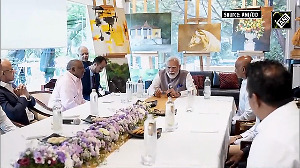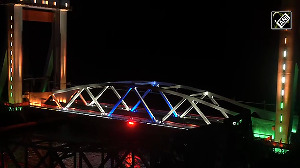Investigating agencies were yet to identify any suspect in the minor blast near the Israeli embassy, a source said on Sunday, but stressed that all angles were being covered in the probe.

The Delhi Police on Sunday covered the blast site near the Israeli embassy in New Delhi with a white-coloured tent to prevent the spot from being tampered with as the adjacent road opened for traffic.
The APJ Abdul Kalam Road, which was closed for nearly two days after the IED blast on Friday, has been opened for general traffic now.
Police also faced some challenges in collecting video footage as most CCTV cameras in the area were not functional at the time of incident, sources said.
They said the material used in the bomb will be known after the report of the forensic science laboratory.
An envelope addressed to the Israeli embassy and containing a note was found at the site of the blast, sources had said.
A case has been registered and the Delhi Police's Special Cell is investigating the matter.
The letter written in English mentioned the names of Gen Qassem Soleimani, the head of Iran's elite Quds Force who was killed in a US air strike in January 2020, and Iran's top nuclear scientist Mohsen Fakhrizad, who played a crucial role in the country's nuclear programme and was assassinated near Tehran in November the same year, they said.
According to sources, police have questioned some persons including a few Iranian nationals and a cab driver who dropped two persons near the blast site just before the explosion.
The details of foreigners who came to Delhi recently are being examined.
Teams from the National Bomb Data Centre of the NSG and Delhi Police's Special Cell visited the spot for post-blast analysis on Saturday.
A senior officer said NBDC's findings will be shared with the police team investigating the case.
Investigating agencies are checking Internet Protocol Detail Record of the area to check whether the suspected persons used internet to communicate instead of regular cellular call. They are also checking CCTV footage of the nearby hotels.
The dump data of mobile calls, which were active hours before and after the blast, are also being examined.
The agencies are collecting data from the cab services of the persons who were dropped in the nearby area of the spot just before the incident happened.
Initial investigations revealed that the IED was planted in a flower pot on the median near Jindal House on A P J Abdul Kalam road outside the Israeli embassy.
A burnt scarf has been recovered from the spot, which has sent for forensic examination, official sources said, adding that a screenshot of Telegram application is circulating where the Jaish-Ul-Hind is allegedly taking the responsibility of the attack, however, its authenticity could not be confirmed.
The minor blast took place on Friday evening in a high-security zone of the national capital. No one was injured.
The blast took place when President Ram Nath Kovind, Vice President M Venkaiah Naidu and Prime Minister Narendra Modi were present a few kilometres away at the Beating Retreat ceremony at the culmination of the Republic Day celebrations.
The explosion took place on a day when India and Israel marked the completion of the 29th anniversary of establishment of their diplomatic relations.











 © 2025
© 2025